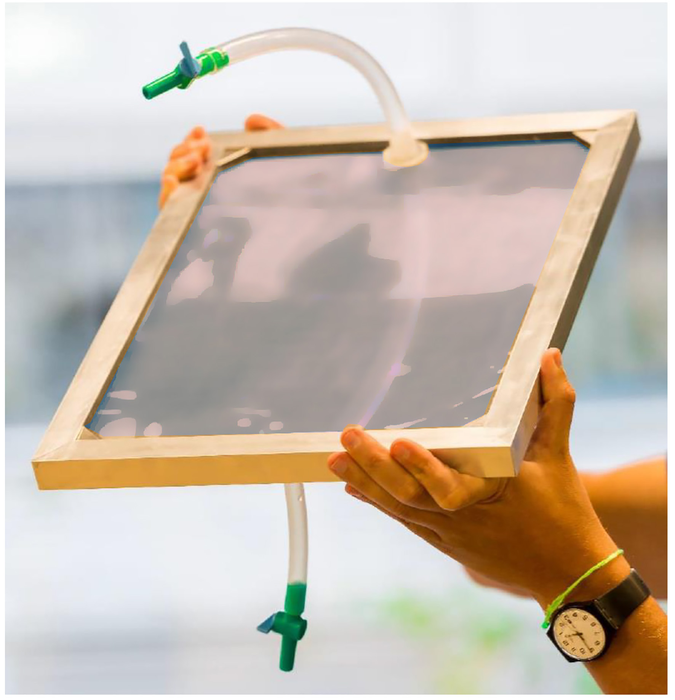Reviewed by Alex SmithApr 8 2022
Clean water is still a luxury for many people throughout the world. According to the World Health Organization (WHO), at least 1.8 billion people drink feces-tainted water, and a substantial section of the world will face water stress by 2040 due to a lack of drinking water resources.
 The prototype of the water purificator held by the Master project student Jerome Gabathuler. Image Credit: École Polytechnique Fédérale De Lausanne.
The prototype of the water purificator held by the Master project student Jerome Gabathuler. Image Credit: École Polytechnique Fédérale De Lausanne.
Furthermore, according to the United Nations Children’s Fund (UNICEF), over 1,800 children die every day as a result of diarrhea caused by contaminated water, which can lead to diseases like cholera.
As a result, developing efficient and cost-effective methods to disinfect water has become critical. That is exactly what a group of EPFL scientists led by László Forró has done with a unique water purification filter that blends titanium dioxide (TiO2) nanowires and carbon nanotubes that are powered entirely by sunlight.
The researchers first demonstrated that TiO2 nanowires may efficiently filter water in the presence of sunshine. However, by combining nanowires with carbon nanotubes, a composite material is created that provides an extra layer of purification by pasteurizing the water, eliminating human pathogens like bacteria and big viruses.
When UV light from the visible spectrum of sunlight strikes the filter, it triggers the production of a group of chemicals known as Reactive Oxygen Species (ROS). These are considered to be excellent disease killers and comprise hydrogen peroxide (H2O2), hydroxide (OH) and oxygen (O2-).
The authors investigated their device with E. Coli bacteria, which is the “gold-standard” for bacterial survival studies, but it should also work with other bacteria pathogens like Campylobacter Jejuni (a common diarrhea-inducing pathogen in the developed world), Giardia Lamblia (a microorganism that causes the intestinal infection giardiasis), and Salmonella.
Cryptosporidium (causes diarrheal cryptosporidiosis), the Hepatitis A virus, and Legionella Pneumophila (causes Legionnaires’ disease) are also included.
The device is extremely effective in removing all pathogens from water, and it also shows promise in removing micropollutants such as pesticides, medication residues, cosmetics and other contaminants.
In a close collaboration between chemists, physicists, and biologists, we have developed a very efficient water purification device, which does not need any energy source but sunlight.
László Forró, Study Team Lead, École Polytechnique Fédérale De Lausanne
“Our prototype can supply clean drinking water even at remote places to small populations and could be easily scaled-up. It is a great achievement and an important “side-product” of this project is that it has attracted a large number of talented and motivated students who care for environmental issues, for sustainability,” Forró added.
The researchers show off a prototype of the filter in their publication, which was published in the Nature partner journal Clean Water, and offer suggestions for improvements.
“I am convinced that it will create a strong follow-up in versatile scientific communities and hopefully funding agencies,” says Endre Horváth, the lead scientist on the research project.
Journal Reference:
E. Horváth, et al. (2022) Solar water purification with photocatalytic nanocomposite filter based on TiO2 nanowires and carbon nanotubes. npj Clean Water. doi.org/10.1038/s41545-022-00157-2.